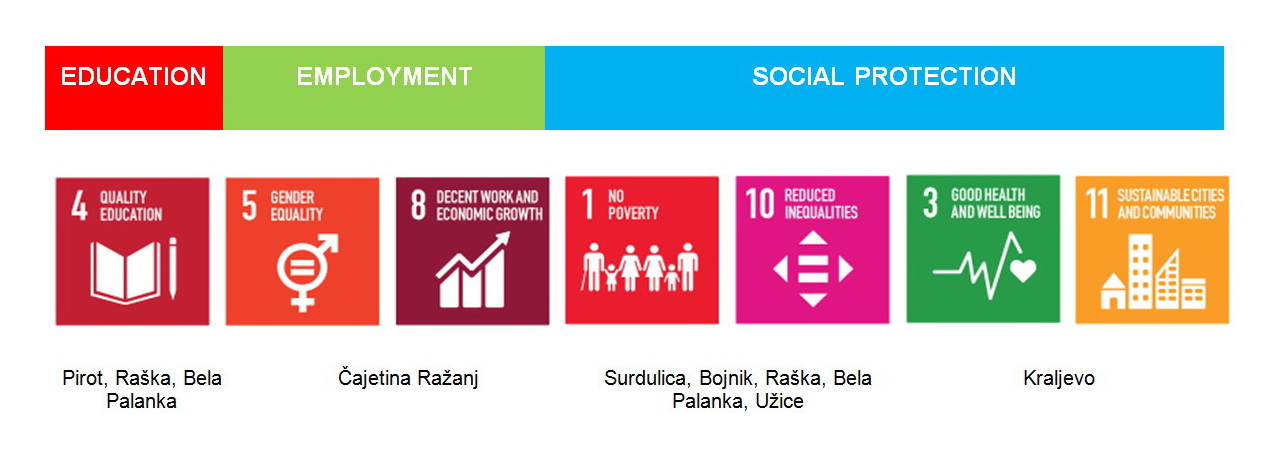 Phase 2 – Support for the testing of developed innovative solutions
Phase 2 – Support for the testing of developed innovative solutions
In February 2019, the Social Inclusion and Poverty Reduction Unit of the Government of the Republic of Serbia (hereinafter: SIPRU) started implementing the second phase of the “Local Initiatives Programme for Social Inclusion and Poverty Reduction – Support to the Development of Innovative Social Inclusion Models – LIP 2” (hereinafter: LIP 2).
The LIP 2 programme is being realised within the project entitled “Support to Improve Social Inclusion in the Republic of Serbia”, implemented by the Social Inclusion and Poverty Reduction Unit of the Government of the Republic of Serbia with the support of the Government of Switzerland through the Swiss Agency for Development and Cooperation (SDC).
The objective of the LIP 2 programme is to promote the social inclusion of vulnerable groups (women, youth, the Roma, migrants, persons with disabilities), especially those living in rural and extremely poor areas, by improving the existing and establishing new/innovative measures/services/programmes in local communities.
By defining new/innovative measures/services/programmes recognized by SIPRU as “socially innovative” approaches, project leaders will define solutions to problems or some of their parts they can affect the most, by adequately responding to a recognized unsatisfied need in the society or a social problem with different processes, concepts, ideas, services and methodologies.
LIP 2 programme includes the territory of local self-government units in two regions of Serbia: Šumadija & Western Serbia region, and Southern & Eastern Serbia region, and the project leaders within this Programme are local self-government units, which will implement their projects in cooperation with civil society organisations.
LIP 2 programme includes two phases:
– Phase 1: Support for the development of innovative solutions (measures/services/programmes)
Implementation period: June – October 2019
Within this phase, the opportunity will be provided, along with the SIPRU’s financial and mentor support, to selected local self-government units to collect the data and prepare a detailed analysis of the issues they want to resolve, conduct consultations with the target groups and relevant stakeholders in the community with the goal of developing/improving the solution, and to prepare a project proposal for testing the innovative solution.
Priority areas of the Programme are:
– Phase 2: Support for the testing of developed innovative solutions
Implementation period: June 2020 – May 2021
After the completion of the first phase of support, the Social Inclusion and Poverty Reduction Unit of the Government of the Republic of Serbia decided which projects will receive support for testing their solutions in practice, based on the elaborated solution models (measures, services or programmes) and the project proposal for its implementation.
Priority areas supported through Phase 2 of the Programme are:
The LIP 2 programme relies on good practices developed under the programme “Local Initiatives for Increasing Social Inclusion and Poverty Reduction (LIP 1)”, implemented during 2015 and 2016. Within the LIP 1 programme, partnerships between civil society organisations and local self-government units were supported, with civil society organisations serving as project leaders. The support was aimed at implementing the recommendations defined in the Second National Report on Social Inclusion and Poverty Reduction for the Period 2011–2014. The Programme supported 11 local initiatives across five thematic areas – education, employment, social welfare, social housing and rural development.
In keeping with the United Nations 2030 Agenda for Sustainable Development and the Sustainable Development Goals, LIP 2 and the supported projects contribute to the achievement of the following Sustainable Development Goals:
Read more on the “Local Initiatives for Increasing Social Inclusion and Poverty Reduction (LIP 1)“.
Previous results
Phase 2: Support for the testing of developed innovative solutions (meaasures/services/programmes)
- Nine projects were selected for support within Phase 2 of LIP2. The projects will be implemented in the following local self-government units: Pirot, Raška, Bela Palanka, Čajetina, Ražanj, Surdulica, Bojnik, Kraljevo and Užice.
Click here to download the document that contains detailed descriptions of the solution proposals from the selected project proposals (.pdf). - Three online workships were held for LIP2 grant receipients on the topic of development of sustainability plans. Click here to download the Sustainability Plan Template (pdf).
- In four local self-government units (Pirot, Užice, Raška and Bela Palanka), whose projects are supported within Phase 2 of LIP 2, mentoring, advisory and professional support will be provided for the preparation of the Programme for Promoting the Status of Persons with Disabilities 2021–2023.
Phase 1: Support for the development of innovative solutions (measures/services/programmes)
- An Open Call for submission of project proposals was published.
- Five info sessions were held, and they were attended by 51 participants.
- The training was held on social innovations and project cycle management for everyone who submitted project proposals.
- Fifteen projects were selected, which will receive support within the first phase of the LIP 2 programme. Click here to download the document which contains detailed descriptions of the solution proposals from selected project proposals.
- The initial workshop was held for the applicants whose project proposals were chosen for support within the first phase of the LIP 2.
- Eight mentors, SIPRU’s long-time associates from the civil sector, were engaged through an internal call. In parallel with the project selection process, the process of selection of mentors at the local level was initiated, and their role will be to support project teams in the segments identified by project applicants, during the introductory workshop, as challenging – creating methodologies for research, creating research tools (questionnaire/survey), data processing and analysis, analysing of problems, regulations and procedures, reporting on the project by using quantitative and qualitative indicators of the project progression, etc.
- Introductory training on social innovations and support packages for applicants was held for mentors.
 Government of the Republic of Serbia
Government of the Republic of Serbia


















 pdf [271 KB]
pdf [271 KB]
Leave a Comment